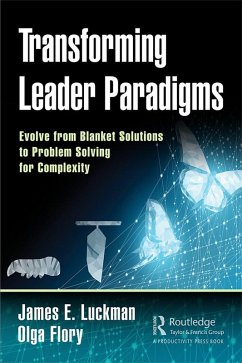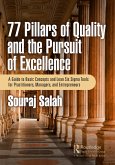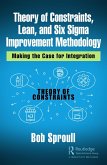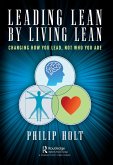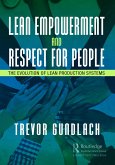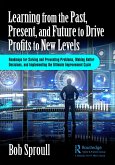- Anand V. Tanikella, Vice President R&D, Abrasives Worldwide, Saint-Gobain
Luckman and Flory explain how to create a platform for change and a culture of meaningful continuous improvement through what they call "Problem Solving for Complexity." This approach is about engaging everybody in the organization to improve every aspect of how work gets done. Read this book if you want to be a real change leader, not just the person who goes around talking about the need for change.
- Robert Kessiakoff, Coach/Consultant, Partner LTGe, Sweden
[This book] describes how the leader, through changing his or her own behaviors and practices, can transform an organization that is slow to adapt into one that solves problems organically. The book is an important read for leaders and managers at all levels.
- Peter Ward, Senior Associate Dean for Academics, Richard M. Ross Chair in Management, Professor of Management Sciences, Director, Center for Operational Excellence, Ohio State University
Organizational transformation is difficult, and despite expensive continuous improvement programs, most change efforts fail. This pattern, James E. Luckman and Olga Flory argue, is due to the fact that most change efforts start with senior leaders assigning an external or internal consulting group to attempt to drive change from the top down. Leaders today can no longer roll out solutions in the hopes of seeing better results. What they can do is play an active role in helping to transform their organization from "blanket solutions" thinking to learning how to solve complex business problems in a rapidly changing world.
Drawing upon decades of leadership experience and years of research with executives across many different industries, Luckman and Flory make a persuasive case that most companies have not been able to stay ahead in what is an increasingly turbulent business environment because they simply have not made the cultural changes required to do so. In discussing how to facilitate this culture change, the authors share a model for leadership designed to guide an organization to extraordinary new levels of performance by focusing on three key areas: building a framework for problem-solving, encouraging respectful communication, and accelerating the pace at which the organization learns. The result is more energized team members who are dedicated to their daily work in an organization that is better positioned to achieve operational excellence. Readers will also find powerful stories from executives who have effectively changed their approach to leadership, all of which serve to inspire more leaders to take the leap and become "problem-solvers for complexity."
Transforming Leader Paradigms is a book about strengthening every organization's capacity to solve complex business problems. But, more importantly, it's about what leaders must change in themselves to help their team members solve problems methodically, start to look at the world differently using complexity theory, and understand what it means to create real value for customers. For leaders who are willing to examine their own behaviors, this book is a welcome change from the steady stream of business books on the market that emphasize charismatic and/or heroic leadership as the key to achievement and success.
Dieser Download kann aus rechtlichen Gründen nur mit Rechnungsadresse in A, B, BG, CY, CZ, D, DK, EW, E, FIN, F, GR, HR, H, IRL, I, LT, L, LR, M, NL, PL, P, R, S, SLO, SK ausgeliefert werden.
- Anand V. Tanikella, Vice President R&D, Abrasives Worldwide,Saint-Gobain
"As a leader, if you truly want to experience what showing respect for your team members does for performance improvement in the short-term and over time, this book should absolutely be on your reading list. Luckman and Flory explain how to create a platform for change and a culture of meaningful continuous improvement through what they call 'Problem Solving for Complexity.' This approach is about engaging everybody in the organization to improve every aspect of how work gets done. Read this book if you want to be a real change leader, not just the person who goes around talking about the need for change."
- Robert Kessiakoff, Coach/Consultant, Partner LTGe, Sweden
"Jim Luckman and Olga Flory provide a thoughtful and well-documented guide for leaders in a world where imposing blanket solutions from the top down just doesn't work anymore. They propose an alternative approach to leadership that systematically empowers all team members and levels to explore the root causes of problems so that they can solve them. Transforming Leader Paradigms describes how the leader, through changing his or her own behaviors and practices, can transform an organization that is slow to adapt into one that solves problems organically. The book is an important read for leaders and managers at all levels."
- Peter Ward,Senior Associate Dean for Academics, Richard M. Ross Chair in Management, Professor of Management Sciences, Director, Center for Operational Excellence, Ohio State University
"Participating in one of Luckman and Flory's 'Transformational Leadership' workshops in 2011 was an important milestone in my professional career as a manager. Trained and educated as an industrial engineer, I became very good at solving problems. But a notable A-Ha moment for me in their workshop was when I realized that I had become a 'Solutions Addict'. This had a negative impact on my team. Since taking the workshop I've changed my own expectations of myself as a manager as well as many of my leadership behaviors. Reading 'Transforming Leader Paradigms' was like reliving their workshop experience again. I recommend it to anyone who is in a leadership position."
- Itai Englander, General Manager, Confectionery division, Strauss Israel
"The lessons in this book are powerful! Luckman and Flory explain why our traditional notions of leadership must evolve as the pace of change increases in our workplaces and our world. Focusing on key leadership principles and methods to engage people and tap into the power of teams-rather than issuing edicts and directives, which only require organizational 'obedience'-Luckman and Flory teach us how to create problem solving cultures that are adaptive, innovative, and passionate!"
- Steven Hall, Vice President, Process Excellence Leader, Liberty Mutual Insurance
"Organizations struggle to build problem solving teams. Individuals, especially leaders, typically lack the skills (and structure!) needed to solve problems effectively. This eventually becomes an organizational deficiency. With this book, Luckman and Flory have captured how to do this well through direct experience and well-researched, well-practiced methods. Read, learn, practice, repeat, and you will learn how to build a problem solving culture and achieve success."
- Jim Huntzinger, Lean Frontiers President/Founder, Lean Frontiers Inc, Purdue University
"As a leader in a university setting, I have encountered problems in recruiting, retention, and student outcomes over the years. Luckman and Flory have taught me how to avoid the dangers of imposing blanket solutions and quit trying to solve systemic problems single-handedly. By encouraging and empowering faculty members in my school to run small PDCA experiments, my team has made tremendous strides in closing the gaps in our recruitment and retention goals. Transforming Leader Paradigms is an insightful read and excellent reminder for how we should lead if we truly care more about our organizations than our egos."
- Dr. Chad E. Wallace, Dean, School of Science & Engineering, Anderson University (Anderson, Indiana)

